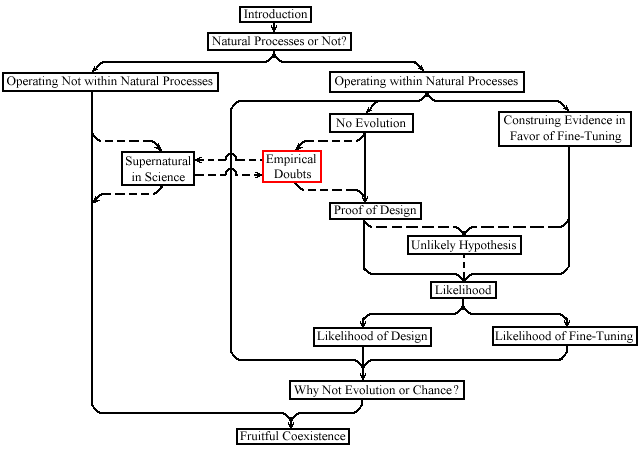

Empirical DoubtsYou may believe that there are serious empirical doubts about Evolution Theory as a scientific theory, or you may believe that Intelligent Design Theory is good science. Let us clarify what we mean by 'Evolution Theory' and 'Intelligent Design Theory'. First, a word about our method of argument.It will do not good in this discussion to divert attention from the matter at hand --- the merits of Evolution Theory and Intelligent Design Theory --- by making assertions about the people who defend them. It would be perfectly simple to argue that evolutionary biologists are atheists who mindlessly apply Darwin's theory with no critical thought, and to thereby dismiss any evidence they offer; it would likewise be simple to disregard the arguments of Intelligent Design theorists because we assume them to be neo-Creationists who want to put God in the Biology texbooks. Perfectly simple, but fallacious. Argumentum ad hominem --- arguing to the man rather than the facts --- is a fallacy that clear thinkers have fruitfully avoided for many centuries. One must stick to considering the arguments and evidence if one hopes to discover any truth in this matter. It is, after all, quite possible that someone might come to have certain beliefs for what we think are bad reasons or with unsavory motives, but that those beliefs might still be true. Now to the matter at hand. There have been many attempts to demonstrate (in some sense of that word) the existence of God. Although Intelligent Design does not purport to do that, it does stand in a line of descent from one of these arguments. There have been ontological arguments (formulated most famously by Anselm) in which one deduces the existence of God from our idea of God. There have been cosmological arguments in which one deduces the existence of a first cause (God) from the fact that every event that has been, has been caused, thus either one must think that causes stretch back indefinitely, or there must have been a first cause. Both of these lines of argument have since been widely discredited. There are, however, teleological arguments for the existence of God: human beings are goal-directed, and things in nature seem to be so too. Worms seem to be exist for the purpose of composting the dead leaves on the forest floor, and the bat seems to exist for the purpose of swallowing up tons of bugs so we are not overun with them. Yet most modern philosophers agree that this is an anthropomorphism, a projection of our way of thinking onto nature, especially since modern science has been able to describe and predict the natural world very effectively without the notion of purposes. But still, in the biological sciences one must admit that each species is very well-adapted to what it does --- almost as if it were designed to be that way. Enter William Paley (1802), who makes an analogical argument: we readily recognize when something is designed for a human purpose, such as a watch. So why can't we recognize that we as complex, well-adapted organisms are desgined by God? Then Darwin (1859) came along with a theory that explained the adaptation without recourse to teleology. Intelligent Design theorists, in essence, have updated Paley's analogical argument, and have dropped the reference to 'God'. They have combined this with a multipronged attack on Evolution Theory, which they term 'Darwinism'. According to the Access Resource Network website (which propagates the writings of Intelligent Design theorists), it should be characterized in this way: Called intelligent design (ID), to distinguish it from earlier versions of design theory (as well as from the naturalistic use of the term design), this new approach is more modest than its predecessors. Rather than trying to infer God's existence or character from the natural world, it simply claims 'that intelligent causes are necessary to explain the complex, information-rich structures of biology and that these causes are empirically detectable.' (Dembski 1999, 106)Thus Intelligent Design is not Creationism, even if one thinks the underlying motivations are the same. Of course this means that if one makes the Intelligent Design argument, one must be prepared for the possibility that one is right, but that it was aliens (natural, not supernatural) who are responsible for designing what we see, and not God. What is Evolution Theory? I have already discussed that it is not based solely on chance processes, but let us characterize it more carefully. McNulty (2002) identifies five assertions (termed 'theories') in Darwin's work:
Now that we have clarified what is on the table, here are the questions and allegations that can be addressed. Each one will have a link back to this page. (These questions are based on those listed and answered by Rennie (2002) and McNulty (2002).)
After having read this page, I suppose it may still be possible to believe that a complex adaptation like the eye constitutes proof of a creator God or an intelligent designer, and could not possibly be the result of the processes posited in Evolution Theory, even if they are empirically well-confirmed. Therefore please continue to Proof of Design to complete the discussion.

|
© David Montalvo 2004
updated 3-22-04